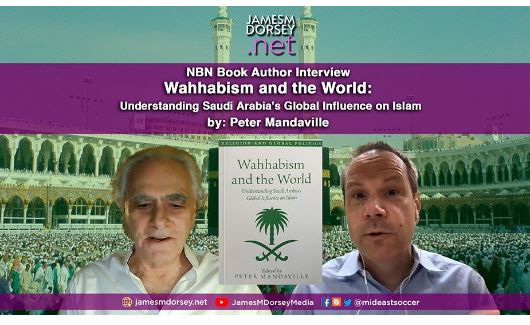New Books Network: Interview with Peter Mandaville, editor of Wahhabism and the World

Saudi global export of an ultra-conservative strand of Islam and its impact on Muslim countries and communities across the globe has been a hotly debate topic for more than two decades. The rise of jihadist groups like Al Qaeda and the Islamic State and their attacks in the United States, Europe, Asia, and Africa fuelled the debate, particularly since the September 11, 2001, strikes in New York and Washington. Critics of Saudi Arabia charge that Wahhabism and Salafism, the ultra-conservative interpretations of Islam associated with the kingdom, created the theological and ideological incubator and the breeding ground for jihadism.
Wahhabism and the World constitutes one of the few, if not the first comprehensive, impassionate interrogations of the impact on the faith of Saudi financial and other support for the global spread of what Mr. Mandaville calls Saudi religious transnationalism and is more colloquially referred to with catchall phrases such as Saudi funding or support for ultra-conservatism. Mr. Mandaville’s volume with chapters that provide fresh insights into the Saudi export drive and a set of case studies illustrates that the reality of the campaign is far more complex and layered.
Interest in Saudi religious influence goes far beyond Middle East and Islam scholars and policymakers, journalists, and analysts, particularly given the dramatic social change in Saudi Arabia since King Salam ascended to the throne in 2015, and his son, Mohammed bin Salman, became the country’s effective ruler. However, social liberalization, including enhanced professional and personal opportunity for women and the creation of a Western-influenced entertainment sector has much to do with socio-political factors and little, if anything, to do with religious reform.
As a result, understanding Saudi Islam and the impact of its export that outlives the Salmans’ steep cutbacks in the funding of its global propagation coupled with their effort to alter its austere and puritan image and give it a more moderate, tolerant and outward-looking makeover remains key to understanding the geopolitics of the Middle East and the broader Muslim world. Mr. Mandaville’s volume makes a ground-breaking contribution to that understanding.
To watch a video version of this interview on YouTube please clickhere.
A podcast version is available on Soundcloud, Itunes, Spotify, Spreaker, and Podbean.
The interview was originally published on New Books Network.
Launched 12 years ago, my column, The Turbulent World of Middle East Soccer, offers, to borrow a phrase from an early proprietor of The Observer, ‘the scoop of interpretation.’ The column continues to have significant impact. It is republished by news websites, blogs, and newsletters across the globe. Maintaining free distribution is key to maintaining the column’s impact. However, to do so, I rely on those readers who value the column and its impact by voluntarily becoming paid subscribers. If you are able and willing to support the column, please become a paid subscriber by clicking on Substack on the subscription button and choosing one of the subscription options. If you prefer, you can also make a donation. Thank you for your continued interest, readership, and support.
Related News

Pakistan Military at the Next Level
By Qamar Bashir What happens when a nuclear-armed country—surrounded by rivals, forged by decades ofRead More

Paigham-e-Pakistan: A collective resolve for peace in Muharram
Hafiz Muhammad Tahir Mehmood Ashrafi (Chairman, Pakistan Ulema Council) As in previous years, this yearRead More


Comments are Closed